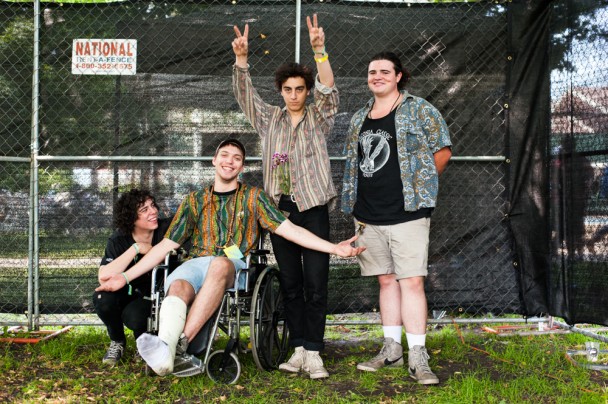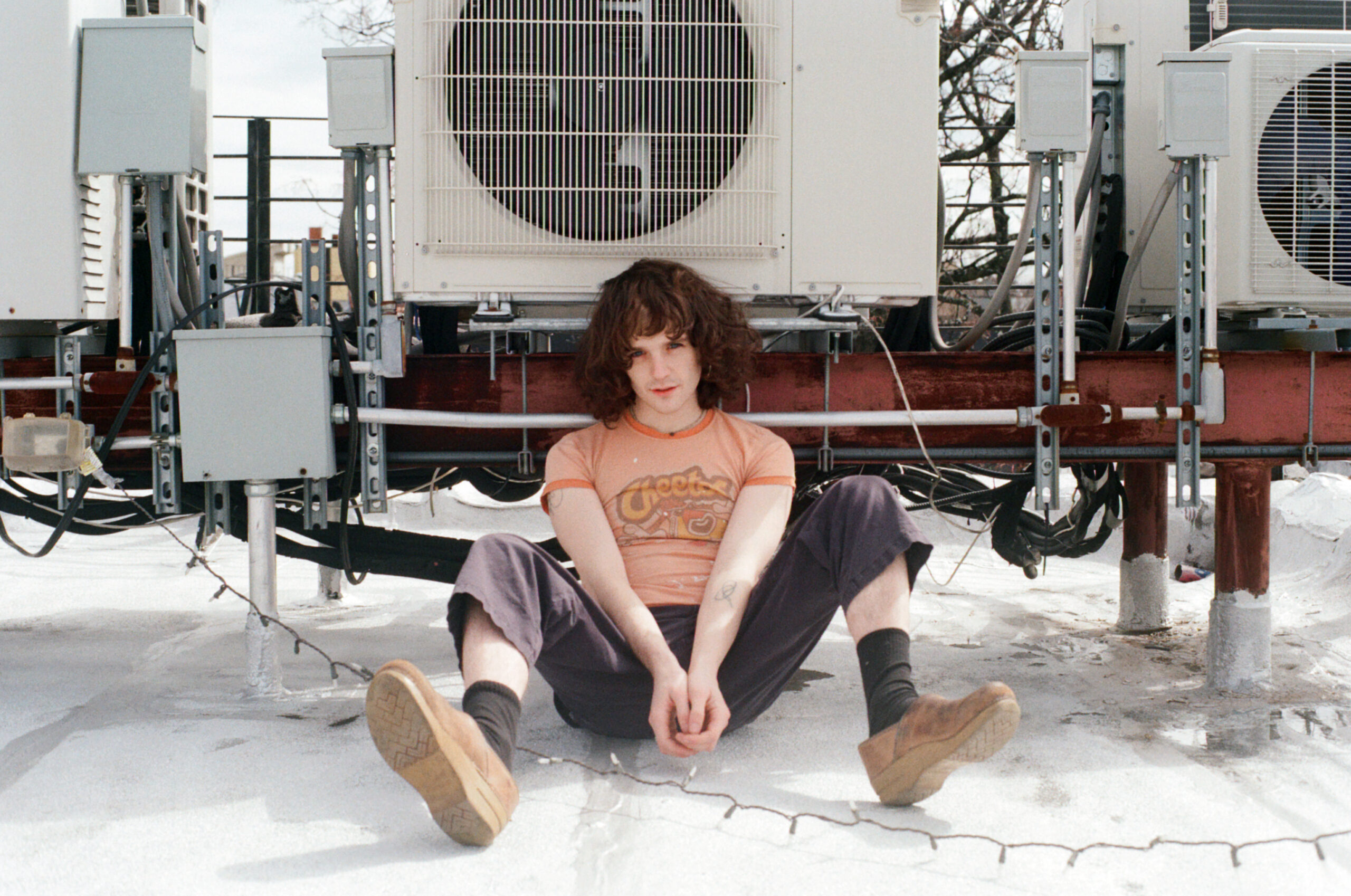Rock 'n' roll: dead? Nah dawg! Twin Peaks are carrying that torch. The youthful Chicago garage band puts the lie to other popular notions too, such as the one where music-loving teenagers only make laptop music these days, or the one where club shows are the next step after house shows (and not the other way around), or the one where bands named after beloved '80s nostalgia totems invariably play misty chillwave jams. Wild Onion, the sophomore LP the band foists upon the world today, reaches much farther back for its retro revivalism. It's pure late-'60s/early-'70s swagger as pilfered from the Beatles, Stooges, and Stones -- especially the Stones, whose Exile On Main Street served as a loose template. Opening track "I've Found A New Way" struts and rages in what is in fact a very old way -- an oldie but a goodie, as they say. What's new about it is the vibrancy that only talented kiddos below drinking age can summon with any real authority. This must be what rock felt like when rock was actually still a youth movement.
And believe me when I say Twin Peaks are young. When I called singer-guitarist Cadien Lake James last week, he was having friends over to his parents' house because his mom was out of town. He spoke with the unmarred enthusiasm of someone who isn't hasn't been conditioned to name-drop more obscure influences than the Beach Boys in interviews -- or who doesn't give a damn about indie-rock decorum and just loves wilding out with his pals.
STEREOGUM: Where are you today?
CADIEN LAKE JAMES: I'm at home. I'm hanging out with some buddies at my parents' house. My mom's out of town, so I've got some people over, you know, it's just the dudes. So, chillin'. And now I'm in my room, so I've got some privacy for the call.
STEREOGUM: I thought everybody who was like 19 or 20 now was supposed to not care about rock 'n' roll and basically be making music on their computers exclusively or something -- but obviously that's not true.
JAMES: Yeah, I don't think that's true. I mean, there's a lot of people that are still down with guitars and drums and bass and shit. You know, rock 'n' roll still rocks on. Just because we all have computers and anybody can listen to anything, people are still digging back and finding the good shit on their computers. And they're like, "Oh, the good shit has got some real instruments and shit." Not that synthesizers don't have their place, but I like real instruments.
STEREOGUM: You guys have been playing together for a fairly long time even though you're so young. You started out playing house shows and stuff in Chicago?
JAMES: Well, I'd say when the band got serious is when we started to play house shows, which is when we were like 18, our senior year. And then we started touring our summer after our senior year, and that's where it kind of became a more serious thing for all of us. But we were playing smaller, mid-sized clubs in Chicago our sophomore and junior years, just like, you know, high school shows with other high school bands. But yeah, just that kind of bullshit. When we started playing house shows and playing in a scene that had a broader range of people and age groups and all that shit is when more people started digging us and the word started spreading more and it got more serious for us.
STEREOGUM: What was the gateway into that scene? How did you guys stumble into that?
JAMES: Well, I mean, I would go to just DIY shows, 'cause my brother, he's playing with some bands we knew like White Mystery, who was a band that was pretty prevalent in that scene in Chicago. So I was aware that it was something that existed in Chicago, and you know, I wasn't going to parties much myself, that wasn't really my shindig for a while, and I would just go to these kind of house shows that were mainly older people and be checking out bands, and we'd go with the Twin Peaks dudes since we were hanging out. So we always going to these shows and we always were about it. We got along with people, but people didn't really want to book our band 'cause we were young. And maybe they were just worried about getting popped for underage drinking or something. They let us come to shows, but no one was booking us or taking us seriously. And then eventually, we were getting more recordings and we got like one show or something, we started playing with this band Slushy I know. We would play shows with them, and then people started being more aware of us or giving us a chance more, and it was very gratifying when we finally could get booked in someone's basement.
STEREOGUM: That's so interesting, because you would expect it to be the other way around, that you would start out playing basements and get excited that you could play the clubs.
JAMES: We were selling out the Beat Kitchen, a 300-capped room in Chicago, and we had sold that out our junior year playing with other buddies of ours. Clay [Frankel] actually, our guitarist now, was playing in another band at the time, and we had a co-headline bill there, our two bands, and sold it out. But it just didn't feel that awesome 'cause at that point it was like entirely just kids who went to your high school, and a lot of it was a popularity thing. People weren't really there for the music, it was just a place to go hang and be like, "Yeah, we're goin' to the show!" It wasn't as gratifying. Not that I didn't appreciate the people who wanted to support us and stuff, it just seemed like they might have been doing it for the wrong reasons. I remember the first time any critic had written about us -- it was this guy Gene, who writes for Windy City Rock, which is a blog in Chicago -- but it was like after we had done our first house show or something. This guy wrote a little piece about some of our demos, and it was just like, you know, it was gratifying to have older people start to get into us. And then just eventually our fan base that we have now started coming together, which is plenty of people who were there earlier on, but weeded out some of the people that were not there 'cause they were actually into what we were writing or anything.
[videoembed size="full_width" alignment="center"][/videoembed]
STEREOGUM: So you graduated about two years ago?
JAMES: Yeah, we would be juniors this fall if we were in college.
STEREOGUM: But you've basically just been touring all that time instead?
JAMES: We were in school for three months our freshman year of college, and then we were gone and did SXSW and have been touring since then, on and off. And working on the music's just been a more full-time gig for us. I think with this release coming up next week, it'll be an even more full-time gig, which is exciting.
STEREOGUM: I heard you were rocking in a wheelchair at Pitchfork. What was that all about?
JAMES: Well, I mean, I've got a fractured ankle I just got surgery on. I got six screws put in it two weeks ago -- two and a half weeks ago now I guess -- and so yeah, I could've used a stool I guess, but I got this wheelchair there 'cause I wanted to go to the festival and a friend said they'd push me around and shit. So I had it, and I used it, and it just seemed like a practical thing 'cause I could move around a bit while still sitting down and resting my leg. But people got a kick out of it, so that's cool.
STEREOGUM: Wild Onion is not your debut album, correct?
JAMES: Yeah, this is our second record. A lot of people are calling it our debut because our first record was so short and also didn't reach as many people as this one is going to, but we're considering it our second record. We're still proud of the first one.
STEREOGUM: What were the circumstances of making this? Like did you make it at home, or in a studio, or what?
JAMES: We did this one in a studio in Chicago, kind of, it felt cozy cause you still like, it's basically this DIY loft space. Like eight people live there. They have a live room, a bar, they have shows, and then they had a studio, which we found out about after we had played shows there. And we did it with some buddies who are in another band in Chicago called Sister Crystals. Their guitarist and their bassist recorded the record with us and kind of co-produced it. They went to school for that shit, so they know how to work the mixing board and shit I don't really care about. But it was cool because it was comfortable enough and cozy enough from earlier situation yet we were able to still take the lead on what we wanted it to sound like and how it was turning out. And it was sweet having a lot more gear we utilized and having more tape machines around to run shit through and being able to work with multiple mics and drums rather than just like one track. Which, I still like lo-fi, but it was definitely a fun learning experience having more to work with.
STEREOGUM: It's a fairly long record as far as the number of songs. Are these all brand new songs or do some of these date back a while?
JAMES: Just a few are kind of older. Like one song on it, "Strawberry Smoothie," the second track, is actually from me and my brother's band, the original version of it, which is like, back to 2009. So that shit's kinda old, but it definitely sounds drastically different now than it did then. The song "Ordinary People" I've had sitting around forever. I don't know how old Clay's are, for him. But for the most part it's all pretty new stuff. We recorded in January and February, and we were writing throughout the fall.
STEREOGUM: When you were working on this record, were you trying to emulate the sound of any record in particular or using any old records as a road map?
JAMES: We don't think about that shit too much. It's hard for us to pinpoint what we're going for. We kind of feel it together. But we're all huge fans of the Beatles' production on all of their records and kind of diving in through there as a framework. We were all getting real into Exile On Main Street and the Stones a couple months before we recorded, so that definitely played a little impact on how everything was turning out.
STEREOGUM: I definitely hear that Exile sound on "I Found A New Way."
JAMES: That's where the 16 tracks kind of came from too. 'Cause at first we were like, "Fuck it, let's make a double album!" Then we kind of realized that there was no way a label was going to press two LPs for us this time around. But we figured we'd at least try to fit as many tracks as we can on each side. We could have fit more, but still. It manages to be like most people's 11-track records, 16 songs from us. Yeah, I don't know what else. We always listen to a bunch of the Dead Boys. I'm always going for the Beach Boys sounds even though it probably doesn't come across much. I think it's funny because people ask us about our influences, and sometimes there's a big disconnect between what we cite and what actually comes across.
STEREOGUM: Honestly, that's the best scenario. When bands are clearly trying to emulate something, it's not typically as good as when the inspiration comes out sounding different on the other side, like it passed through a skewed prism.
JAMES: You don't want anything to sound forced. You don't want to try too hard to sound natural because that ends up sounding unnatural too. We just try to write good songs that we would buy if we heard it on a record. We just want to make shit that we would go to the store and buy. Something I was thinking about the other day was how I would describe what we're going for in the simplest terms. And this probably isn't accurate either, but I was just like, "Beatles meets Thee Oh Sees." And I don't know if that makes any sense or applies, but I thought that was kind of funny. I could get down with that.
STEREOGUM: Tell me about your label, Grand Jury.
JAMES: It's a brand new label. We're actually the first release on the label. They're actually based out of New York. It's our friend Craig Winkler, the behind-the-scenes mayor of New York. Not really, but that's our joke because he knows everybody when we're hanging out in New York. He was working with Mom + Pop for the last five years, and he's actually from Indiana and spent a lot of time in Chicago during his 20s and 30s, I think. So he's just a real cool guy. He hit us up a while ago when he was still with Mom + Pop and was like, "Yo, I'm from Chicago. I want to help you guys out however I can." And then throughout the year after that we stayed in touch, and it ended up working out that we were looking to sign just as he was starting his new project. And we all got along and had similar ideas about where things should be going, so it seemed to make sense. We're working out a UK label for it right now. Should have some info on that soon.
STEREOGUM: I've read in other interviews that you didn't choose the name Twin Peaks because of the TV show. Where did it come from, then?
JAMES: None of us had watched the TV show. My brother was watching it when we chose it. We were all like 16. And he was like, "You guys should start watching this show Twin Peaks." We didn't really think twice about it. We didn't know anything about the show except that it had this cult following and shit. So we just rolled with it. Later we watched it and ended up liking it. It bites us in the ass sometimes because some people are going to get real pissy about it and give us a hard time. In one sense it's just like, "Fuck it and whatever." People are going to make fun of you for responding to any of that. But on the other hand, we were just 16 and making good music, I think. People can give us crap for having the same name as the show, like "How can they ever compare?" But it's just a fucking name. If you're going to judge us based on that or try to compare us to the show, I guess that's our fault, but we never asked anybody to compare us to the show. But fuck 'em, man. We're just playing rock 'n' roll and we want to have a good time. If they don't want to have a good time, they can fuck off.
Wild Onion is out today on The Grand Jury.






